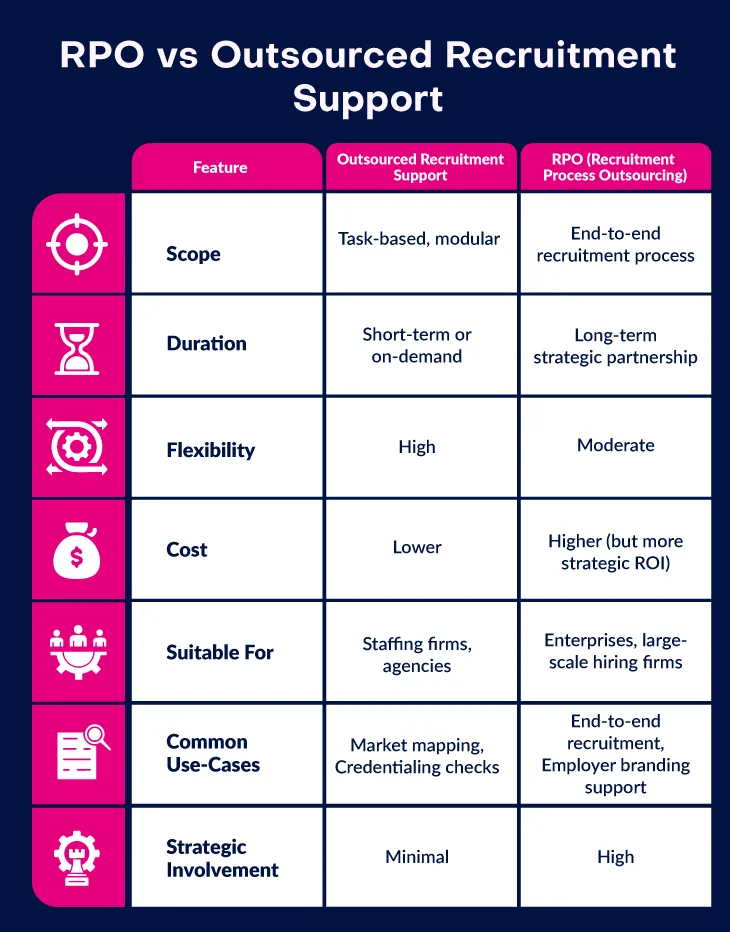Topics: Outsourced Recruitment, Recruitment Outsourcing, RPO
Posted on May 09, 2025
Written By Ranjana Singh

Whenever we search on Google for Outsourced Recruitment Support the results we receive are mostly about RPO. This made us wonder, are our audiences also confused between outsourced recruitment vs RPO?
It is also true that several staffing professionals use RPO and outsourced recruitment support terms interchangeably, assuming they offer similar solutions. However, the differences are quite significant, and choosing the wrong model can result in mismatched expectations, wasted spend, and inefficiencies.
That’s why we’re creating this detailed blog, to explain clearly what RPO is, what Outsourced Recruitment Support means, the key differences between them, and which model is best suited for your business.
Outsourced Recruitment Support or recruitment support services is task-based, short-term, and highly flexible. Instead of handing over your full hiring function, you simply offload certain parts of the process to an outsourced recruitment company like QX Global Group.
Staffing firms that need:
It’s fast to deploy, cost-effective, and doesn’t require long-term commitment. You get outsourced recruiting services tailored to your current workload without overhauling your entire hiring process.
Recruitment Process Outsourcing (RPO) is a strategic, long-term partnership where an external provider manages all (or most) of your recruitment process.
Organizations looking to:
RPO and recruitment go hand-in-hand for companies seeking deeper hiring transformation. RPO solutions offer scalability, strategic alignment, and often lead to better hiring outcomes. RPO firms act as an extension of your internal HR/recruitment team.

Choose Outsourced Recruitment Support if:
Use-Case 1: A healthcare staffing agency needs help scheduling shifts and handling weekend queries. They outsource shift-booking to an offshore team to improve turnaround time and coverage.
Use-Case 2: A recruitment agency wants to maintain quality while scaling. It outsources CV sourcing to free up consultants for client-facing work.
Choose RPO if:
Use-Case 1: A global tech firm partners with an RPO provider to build talent pipelines across five regions and reduce hiring time by 35%.
Use-Case 2: A manufacturing company uses RPO to centralize hiring, enhance employer branding, and standardize candidate experience.
Outsourced recruitment is task-specific and tactical, ideal for short-term support. RPO is a comprehensive, strategic engagement that manages your full recruitment life cycle—this model is commonly referred to as RPO recruitment process outsourcing.
Outsourced recruitment support is modular—you pay only for the services you need. This avoids overheads tied to full-scale recruitment management in RPO.
You can add or reduce support based on demand—whether it’s seasonal spikes, last-minute bookings, or sudden staff shortages—without changing your core hiring model.
By offering agile, on-demand support, outsourced recruitment allows businesses to respond quickly to changing market needs, roles, and candidate availability.
RPO involves long-term contracts and complete control handover, which may not suit all businesses. Outsourced support reduces dependency and allows you to retain process control.
Choosing between Outsourced Recruitment vs RPO isn’t just a cost decision, it’s about flexibility, control, and long-term impact. Most importantly, choose the solution that aligns with your business stage and needs. A one-size-fits-all approach doesn’t work in recruitment, and that’s where our tailored outsourced recruitment solutions come in. Let’s talk about your challenges, goals, and how we can support you, strategically or tactically, exactly where you are..
Still unsure whether to go with RPO or Outsourced Recruitment Support? Connect with our team of experts for a free consultation.
Originally published May 09, 2025 09:05:38, updated Jan 23 2026
Topics: Outsourced Recruitment, Recruitment Outsourcing, RPO